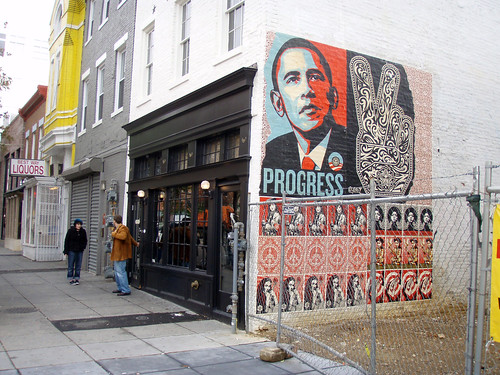Obama: Talent Imitates, Genius Steals
As the campaign progressed many pundits were taken aback by the way in which the candidate had managed to use the net to mobilise supporters in a way never seen before. By allowing supporters to take his core values and messages, tweak them and broadcast them in whatever way they saw fit (such as the […]
As the campaign progressed many pundits were taken aback by the way in which the candidate had managed to use the net to mobilise supporters in a way never seen before. By allowing supporters to take his core values and messages, tweak them and broadcast them in whatever way they saw fit (such as the video below which was submitted to a YouTube competition), he had made this the first UGC campaign. By taking citizen journalists seriously, he had ensured that the bloggers were on his side. And by utilising social networks, he had made sure that his supporters were organised in such a way as to maximise his vote.
[youtube]https://www.youtube.com/watch?v=JZkpbZ5Xjg8[/youtube]
Who am I talking about? Obama, surely? Well, actually, no. Howard Dean. As these articles from The Guardian & Wired detail, Howard Dean was in many ways the test bed for many of the tactics that Obama’s team used to make the most of the web as a campaigning tool. And Dean was building on the learnings from the original, innovative Presidential campaign to use the web – that of a certain John McCain, back in 1999.
So what does this tell us? That Obama is all flash and that his much vaunted utilisation of the web to amass unheard of funds and to mobilise thousands of volunteers, was all hype? Absolutely not. It tells us that just because something has been done before, that doesn’t mean it can’t be done again, and better. On inauguration day, let’s look at some of the things that Obama did, how he built on the successes of others, and what brands could learn from one of the greatest marketing campaigns of the 21st Century.
- Let go: If you’re going to try to harness social media, you also need to be prepared to release control of your brand. The, now iconic, Obama Hope posters were not official products of the campaign but created by street artist Shephard Fairey (better known as Obey Giant). But the Obama campaign encouraged this pirating of its brand, a meme was born & Fairey has now produced the official inauguration poster.
- Listen & respond: One of the things Republicans had done very successfully in past campaigns was to use the internet to promote stories which adversely effected the perceptions of their Democratic opponents*. Like a reputation management professional, Obama used the web to quickly counter such stories, showing that you should always be thinking about what people are saying about you.
- Embrace the conversation: Obama’s campaign didn’t just pay lip service to citizen journalism, it actively embraced it. Inviting hundreds of bloggers to the convention was a masterstroke and just showed that it’s not the medium that matters, it’s the readers you reach, and influence, through it.
- Make it easy to share: As well as generating PR for the novelty of the method of delivering the news, announcing the choice of Vice-Presidential candidate by email & text also meant that Obama’s supporters were able to quickly forward the news on, maintaining the buzz. Creating ‘viral’ content is, in many ways, the Holy Grail of modern marketing, but ensuring the content has sharing built into its DNA is a good start.
There are of course many more lessons to be learned from the Obama campaign, as well as those of his opponents. Because what all this also proves is that if the message doesn’t match the brand and isn’t right for the audience, then noone will buy it. For what really differentiates Obama from those who went before him, such as Howard, McCain (in ’99) and even Ron Paul, is that he got elected and they didn’t.
*This is not a political post so I make no comment on the validity of the stories circulated by the Republicans or the Democrats. I’m just interested in how they used the web to do this.
Obama Obey Giant poster by Daquella Manera on flickr
Contributing authors are invited to create content for Search Engine Land and are chosen for their expertise and contribution to the search community. Our contributors work under the oversight of the editorial staff and contributions are checked for quality and relevance to our readers. The opinions they express are their own.
Related stories
